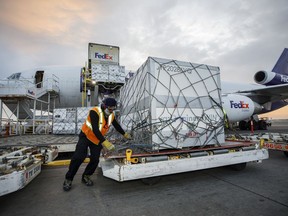'We found that the Public Health Agency of Canada was unsuccessful in its efforts to minimize vaccine wastage'

OTTAWA — Tens of millions of doses of COVID-19 vaccines are likely about to expire and go to waste because of a failure to manage an oversupply of doses, at an estimated cost of about $1 billion, Canada’s auditor general reported Tuesday.
Karen Hogan has released the results of her office’s investigation into the government’s efforts to get ahold of COVID-19 vaccine doses in the early days of the pandemic, and track how many people got them.
Sign up to receive the daily top stories from the National Post, a division of Postmedia Network Inc.
Thanks for signing up!
A welcome email is on its way. If you don't see it, please check your junk folder.
The next issue of NP Posted will soon be in your inbox.
The auditor gave the Public Health Agency of Canada and Procurement Canada a thumbs up when it came to quickly getting enough doses into the country to meet vaccination goals, but said the government did a much poorer job of managing all that supply.
“We found that the Public Health Agency of Canada was unsuccessful in its efforts to minimize vaccine wastage,” Hogan wrote in the report.
-

Auditor general finds a 'minimum' of $27.4 billion in suspicious COVID benefit payments
-

CRA clawing back $3.2B from suspect COVID-19 aid payments, but that's just the start
The government knew that by signing advanced purchase agreements with a number of pharmaceutical companies there was a risk of buying up more COVID-19 vaccines than Canadians needed.
PHAC and Procurement Canada signed deals with seven companies that were developing vaccines in 2020 and 2021, in case only a few them were approved by Health Canada.
So far six of those have been authorized by the drug review agency.
The auditor found that about half of the 169 million doses the government paid for have made it into the arms of Canadians between December 2020 and May 2022.
The federal government announced plans to donate some 50 million surplus doses to other countries, but as of May 31 only about 15 million had been given away and another 13.6 million expired before they could be donated.
Canada has offered the remaining 21.7 million doses to other countries, but they will be wasted if they are not distributed soon.
There were also 32.5 million doses in federal and provincial inventories by the end of the audit period in May, worth about $1 billion, based on the auditor’s estimate.
Hogan said in her report that the majority of those doses will expire by the end of 2022.
Part of the problem, she said, was that provinces and territories did not communicate and share data with PHAC.
“Although some provinces and territories consistently reported to the agency, the agency was unable to obtain complete data from most. This meant that the status of these doses was unknown and reduced the agency’s ability to predict supply needs and plan for donations,” the report said.
The auditor general’s office and the public health agency itself warned for a decade before the COVID-19 pandemic that there were serious gaps in the federal and provincial health data sharing plans.
In January 2021, Deloitte Inc. was awarded a $59.1 million contract to come up with a national vaccine management system called VaccineConnect to share timely information about vaccine distribution, coverage and safety.
Some elements of that program were up and running on time, but others were delayed and the auditor found that PHAC was instead using spreadsheets to manually track expiration dates and waste as of June 2021.


